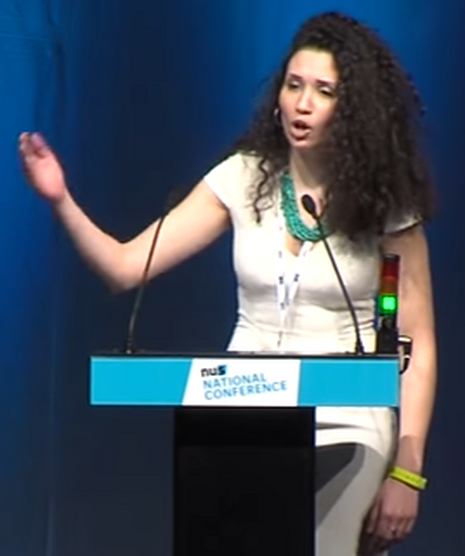NUS must ‘regain the trust of Jewish students’, says report
Report released by NUS VP also suggests universities are failing to accommodate the needs of Jewish students

NUS Vice-President for Society and Citizenship Robbie Young has released a report into the experiences of Jewish students and their attitudes towards NUS, universities, and student unions.
The report highlights many Jewish students’ lack of faith in NUS to deal with anti-Semitism effectively, stating that NUS needs to “consider further how to regain the trust of Jewish students.” It also claims that many Jewish students “do not feel their institution understands their needs”, and thus “there is still further work to be done on supporting students to gain the best possible provision from their institutions.”
NUS has been embroiled in a lengthy controversy over its relationship with Jewish students since the election of Malia Bouattia as its President in April of last year. During the campaign, it emerged that Bouattia had previously referred to the University of Birmingham as “something of a Zionist outpost” and had also made reference to “Zionist-led media outlets”, remarks which were widely condemned as anti-Semitic, a charge which she denies.
The dispute flared up again in October with the release of a report by the Home Affairs Select Committee which accused Bouattia of “outright racism”, and once more in January, when Richard Brooks, NUS Vice-President for Union Development, was secretly filmed calling Bouattia a “racist” and claiming to be organising the opposition to her within the NUS. The issue is likely to take centre stage in the forthcoming NUS conference, in which Bouattia is running for re-election.
The introduction acknowledges this contention, noting that “the role of NUS and the wider movement is under intense scrutiny” partly due to Bouattia and “comments she had made prior to taking up office.” However, the report claims that “It was never her intention to cause offence and she has apologised and revised her language accordingly.” It also cites a number of reasons for the report unrelated to the issues within NUS, including an increase in “concern around anti-Semitism in society”, to which the “higher education sector has not been immune”.
The report mostly focuses on a survey undertaken by NUS and the Union of Jewish Students (UJS). It was answered by 485 self-defining Jewish students, almost all of whom were in full time education and aged between 17 and 24.
It notes a number of problems in the relationship between NUS and Jewish students. 49 per cent of respondents to the survey said that they would not feel comfortable attending NUS events, 42 per cent would not feel comfortable engaging in NUS policy-making processes, and 65 per cent said they did not feel NUS would respond appropriately to allegations of anti-Semitism if they arose, with just 15 per cent saying that they did think it would respond appropriately.
However, it argues that this lack of trust is not principally related to the current leadership, claiming that just two per cent of respondents to the survey referred to this controversy.
The report also examined Jewish students’ relationships with their universities and student unions. According to the report, a majority of Jewish students feel able to engage with their individual student unions, with 75 per cent saying that they voted in student elections and 69 per cent saying that they always or usually were able to participate in student union societies.
However, some respondents spoke of faith-based barriers to engagement, such as events being held on the Sabbath and a lack of kosher food, while some also reported that fear of being judged for having a pro-Israeli stance in the Israel/Palestine conflict or simply being an Israeli were barriers to engagement.

What is more, 43 per cent said they did not feel their student union understood their needs as Jewish students, and 51 per cent said they did not feel represented by their student union.
The report also raised issues with universities’ behaviour towards Jewish students, although many findings in this area were positive. 57 per cent said that they had not experienced negative issues in classes related to Judaism, and 56 per cent said that their university would respond appropriately to allegations of anti-Semitism, with 19 per cent saying that it would not. But while a plurality of respondents to the survey, 36 per cent, said that they felt comfortable with the way issues relating to Judaism and Jewish people were covered in academic settings, some 20 per cent were not. Students provided anecdotes of lecturers making anti-Semitic jokes and remarks.
The report also found that universities are not always cognisant of the specific needs of Jewish students. 59 per cent of respondents said that their university does not adapt exam schedules to the Sabbath or Jewish festivals, with some students also indicating that they had been threatened with academic ramifications as a result of absences stemming from their need to observe religious events. 42 per cent of respondents told the survey that there was no kosher food available on or near campus.
On the issue of hate crime, the survey found that 73 per cent of respondents were not very worried or at all worried about being subjected to verbal abuse, assault, vandalism, damage to property or theft as a result of their Jewish identity, while 65 per cent had not experienced any crime at their current place of study. However, over a quarter had experienced abuse through social media or another form of communication, and 66 per cent of those who had experienced crime believed that it had been motivated by prejudice against their Jewish belief.
In its recommendations, the report calls upon NUS to reaffirm “its commitment to actively challenging anti-Semitism” by, among other things, encouraging better understanding amongst student unions of the contexts “where criticism of Israel can become anti-Semitic”; reviewing “any motions, policies and procedures” to ensure that they “uphold the definition of anti-Semitism” adopted by the organisation; and reviewing its procedure for dealing with anti-Semitic incidents.
It further proposes a slate of other policies for the organisation to adopt to ensure that Jewish students are able to engage fully with student unions and NUS and that provision for them in universities is adequate, including a “bi-annual interfaith meeting”, the formulation of guidance for debates on Israel/Palestine, and educating its staff and volunteers on anti-Semitism.
The report also recommends that NUS works with bodies representing universities to examine Jewish students’ issues, especially those relating to lecturers’ behaviour, and that universities themselves work to accommodate religious considerations in their timetabling and provision of meals.
It encourages student unions to identify and properly train an officer responsible for engaging Jewish students, to ensure that Jewish students have a space to discuss issues that affect them, and to “take forward issues on campus for Jewish students”.
The UJS welcomed the report, its Campaigns Director Josh Nagli saying that its “thoughtful and constructive recommendations” would have “a profoundly positive impact on Jewish student life” if implemented.
He said that it was “unsurprising” that the report showed distrust amongst Jewish students for NUS, adding that the organisation “must work to rebuild trust with Jewish students and, along with students’ unions and higher education institutions, aim to fully understand Jewish students’ needs.”
Varsity has contacted NUS for comment.
 News / Colleges charge different rents for the same Castle Street accommodation2 March 2026
News / Colleges charge different rents for the same Castle Street accommodation2 March 2026 News / News in Brief: waterworks, wine woes, and workplace wins 1 March 2026
News / News in Brief: waterworks, wine woes, and workplace wins 1 March 2026 News / Climate activists protest for ‘ethical careers policy’1 March 2026
News / Climate activists protest for ‘ethical careers policy’1 March 2026 News / Private school teacher who lied about Cambridge degree barred from teaching27 February 2026
News / Private school teacher who lied about Cambridge degree barred from teaching27 February 2026 News / Angela Merkel among Cambridge honorary degree nominees27 February 2026
News / Angela Merkel among Cambridge honorary degree nominees27 February 2026








